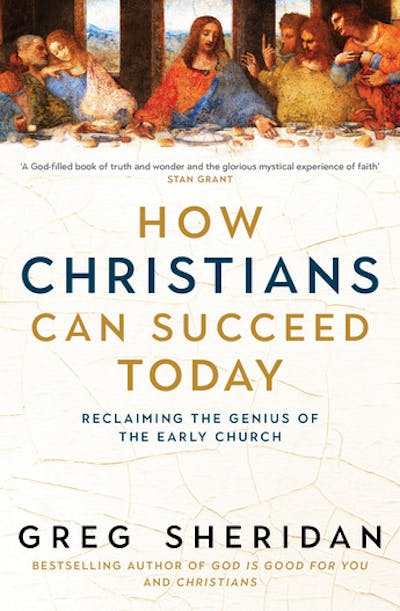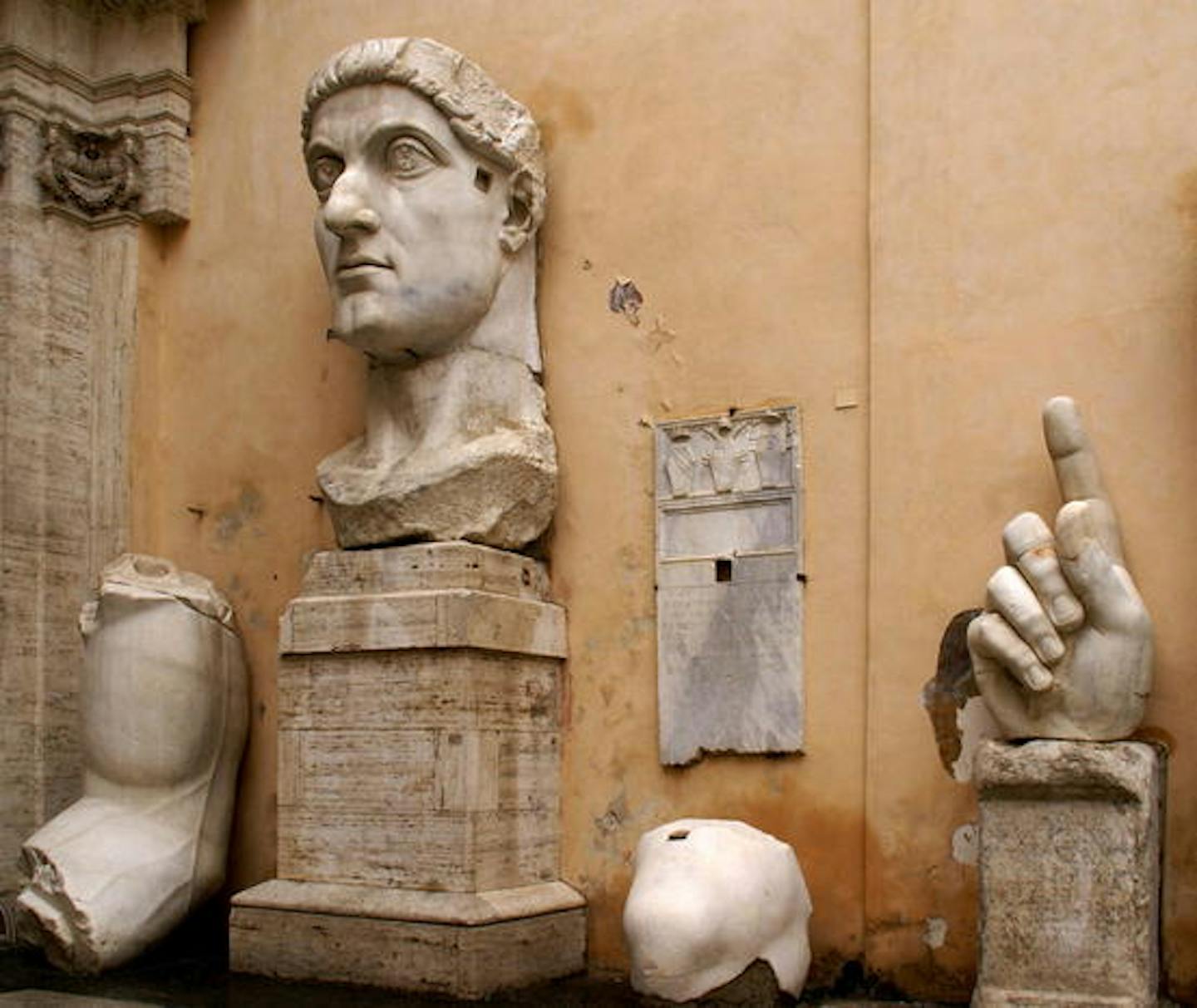
Greg Sheridan’s new book on Christianity is part history lesson, part cultural commentary, and part Christian witness. It proposes that Christians in the West can learn a great deal from early Christianity about how to “succeed” in a non-Christian world.
Review: How Christians Can Succeed Today: Reclaiming the Genius of the Early Church – Greg Sheridan (Allen & Unwin)
There is a lot of great material in the book, framed by opening and closing chapters that position Christianity as a religion under threat from a world that is, in Sheridan’s words, “deeply hostile to Christianity”. The decline in church attendance and those identifying as Christian is presented as evidence we are “abandoning God” and becoming neo-pagan or post-Christian as a culture.
“Pagan” Rome is bluntly described and serves as a straw man, against which Sheridan posits early Christianity as the loving and brave hero.
Early Christians
Sheridan proposes that ancient Rome was “more similar to today’s world than you might think”. But in drawing parallels between the ancient world and ours, he erroneously downplays how deeply religious Roman society was, as well as the importance of ethics and virtues in its philosophical traditions.
In the first century Roman Empire, religion infused every part of life. Regular people encountered religious iconography, temples, sacrifices, rituals, divination, healing, hymn singing, prophecy, and priests as part of their daily lives. The polytheism of the Mediterranean world was complex and unlike Jewish and Christian monotheism, but being non-religious was not an option.
In this way, Roman society differed markedly from modern Western culture, which Sheridan calls “neo-pagan”.
The first part of the book tells the story of early Christianity. Here Sheridan draws out certain qualities that distinguished Christians from the surrounding culture: their bravery in facing death; their belief in the inherent dignity of women, children and the enslaved; their ethics and their love for the marginalised; their passion for a distinctive life of faith.

Sheridan highlights things modern Christians might learn from these early Christians. Readers unfamiliar with the first few centuries of Christianity will find helpful and rich things to think about in these chapters. And I agree with the gist of Sheridan’s narrative. As a historian of early Christianity, however, I found myself quibbling over certain presentations or omissions.
For example, in emphasising the way the lives of women and girls were valued by early Christians, because they too reflected the image of God, Sheridan emphasises two things. The first is the New Testament teaching that men should love their wives (not simply rule them). The second is that Christians were less likely to practice infanticide of girl babies.
These are both true. But the emphasis on monogamous marriages and large families as the core of early Christianity suits the modern emphasis on the nuclear family, rather than reflecting the full reality of the early church. Absent from the narrative is the radically countercultural embrace of celibacy – something Paul advocated, Jesus lived, and Christians took up.
For women in antiquity, whose lives were governed by their fathers or husbands, celibacy provided an attractive escape from domesticity and the considerable dangers of childbirth.
Persecution and martyrdom
Striking, too, is Sheridan’s treatment of the narrative of martyrdom and Christian bravery in facing death.
Sheridan writes that “most of the time, Christians were not actively persecuted”. This accurate summation, however, is undone by the number of pages devoted to retelling stories of heroic martyrs and repeating phrases like “wave of persecution”. The reader could easily be left thinking martyrdom was a threat to most Christians, rather than something occasional (which may, of course, have been just as terrifying in its unpredictability).
I wondered what Sheridan would make of historian Candida Moss’s award-winning book The Myth of Persecution (2013), which argues early Christians exaggerated accounts of persecution and martyrdom as part of their identity formation. Moss contends – and I agree – that the amplification of ancient persecution suits the contemporary narrative of hostility towards Christians in the West. Moss is not in the bibliography, though she is in the bibliographies of other books Sheridan cites.

Despite these quibbles, I wholeheartedly concur with Sheridan’s conclusion to part one of the book: “We shouldn’t let our minds be too narrow to learn from the early Christians, whom our culture has almost entirely forgotten.”
As a Christian, like Sheridan, I think there is much to learn from the early church. We can learn from the way its followers engaged with the surrounding culture, navigated difference, communicated across cultural divides, and balanced behaviour and belief as equally important expressions of faith.
Contemporary Christians
The second part of the book turns to contemporary Christians. Over seven chapters, Sheridan tells the stories of Christians living out their faith. Well known figures, such as novelist Marilynne Robinson and former US Vice-President Mike Pence, are interviewed alongside lesser known but fascinating people.
The story of Danny and Leila Abdullah and the tragic death of three of their children, killed by a drunk driver in Sydney, is deeply moving. Their forgiveness of the driver is portrayed as living out of biblical values in the contemporary world, an act of profound grace, and a point of healing for themselves.
At times, Sheridan is an uncritical storyteller of some of these allies of “successful” Christianity. If a person or movement has some positive aspects, then any potential negatives can be more or less ignored.
For example, Sheridan paints a glowing portrait of Pence. Pence is to be respected as a sincere Christian. But Sheridan does not ask about or examine how Pence came to support Donald Trump, knowing what was known about Trump at the time, right up to that fateful day in January 2020, when a violent mob stormed the Capitol building threatening Pence’s life.
Similarly, Sheridan appears starstruck by psychologist Jordan Peterson. He is at pains to make him a Christian, despite acknowledging that Peterson has never publicly claimed to be one.
Peterson has written about the Bible and uses parts of Christian tradition in his own work, leading Sheridan to treat him as if he is some kind of theological authority. He is not. In fact, Peterson gets fundamental things about Christianity wrong (but that’s another essay).
Success in an ‘apostolic age’
Lastly, to success. Sheridan defines success predominantly in terms of growth. He admires the early Christians for the “expansion of their movement”.
This is a familiar category for those of us in the West, who are shaped by capitalist and imperial mindsets where growth is good. But if success is expansion, it is unclear to what end. Political power? Social influence? A full church?
Success is not a Christian or theological category. If the calling of the church is to love the world like God does and help people follow Christ, are there times that might look like failure by modern standards, which value power and wealth?
Furthermore, the history of Christianity after the conversion of the emperor Constantine in 312CE serves as a reminder that a “Christian” empire can look a lot like a pagan Roman empire. When Christians get power, they can become as oppressive and corrupt as anyone else.

In the current global landscape, there are numerous examples of Christianity being co-opted for authoritarian ends. Sheridan is certainly not advocating that, but neither does he anticipate theocratic authoritarianism or neo-imperialism as possible interpretations of Christian “success”.
Positively, Sheridan’s examples of faith include Mother Teresa and other figures whose commitment to poverty and service do not necessarily lead to numerical growth or political power. This suggests there is a more subtle, nuanced sense of success being invoked, albeit implicitly.
For Christians mourning the end of Christendom, this book will resonate. I ultimately disagree with Sheridan about the extent to which our society is hostile to Christians and the extent to which it resembles ancient Rome, but I concur that we cannot go back to Christendom. Nor should contemporary Christians settle for moralism devoid of God, cultural conformity, and the privatisation of faith.
At the end, Sheridan turns to language of the “apostolic age” of the first century. He offers a thoughtful way to recognise the best in the early church, even though our world may be fundamentally different to theirs.
In the apostolic age, Christians had to defend their ideas in the public square, rather than speak from a place of privilege. The decline of institutional and cultural Christian dominance puts us back in such a space, which might actually be a good thing.
This article is republished from The Conversation, a nonprofit, independent news organization bringing you facts and trustworthy analysis to help you make sense of our complex world. It was written by: Robyn J. Whitaker
Read more:
- How Philly anarcho-punks blended music, noise and social justice in the 1990s and 2000s
- The thousand-year story of how the fork crossed Europe, and onto your plate today
- Alexis Wright has revitalised Australian literature, but a new book by a ‘superfan’ overlooks an important aspect of her work
Robyn J. Whitaker does not work for, consult, own shares in or receive funding from any company or organisation that would benefit from this article, and has disclosed no relevant affiliations beyond their academic appointment.


 The Conversation
The Conversation
 The US Sun Latest
The US Sun Latest Deseret News
Deseret News CBN Christian World News
CBN Christian World News Laconia Daily Sun
Laconia Daily Sun Catholic News Agency
Catholic News Agency Iron Mountain Daily Life
Iron Mountain Daily Life Newsweek Video
Newsweek Video